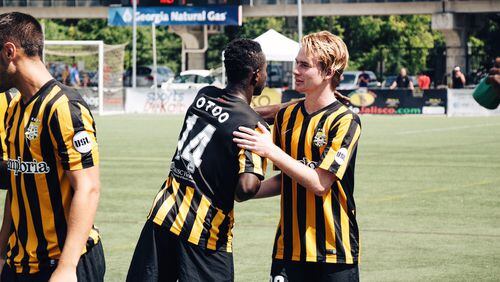Atlanta United is reportedly interested in launching its own USL team.
The team has declined to comment on the report, but it also hasn’t said if it is renewing its relationship with Charleston, its USL affiliate for the past two years.
Here’s a quick primer on the USL:
What is it?
It’s the United Soccer League. It is the second division of professional soccer in the U.S. Teams play a 32-game schedule that starts in late March and finishes in mid-November. The league’s championship game will be Monday in Louisville, Ky.
Where is it?
The league is composed of 30 teams, ranging geographically from Vancouver to Orlando. The league is currently divided into two 15-team divisions. The league office is in Tampa.
Does USL have the same expansion fever as MLS?
Yes. There are five teams scheduled to come online, including in Birmingham, but Nashville seems destined for MLS and Austin’s future is tied to Columbus’.
Do any MLS teams have affiliations with USL teams?
Oh yes. Several have affiliates or own teams in the league:
From the MLS website:
Atlanta United FC – Charleston Battery (affiliate)
Chicago Fire – Tulsa Roughnecks FC (affiliate)
Colorado Rapids – Charlotte Independence (affiliate)
Columbus Crew SC – Pittsburgh Riverhounds (affiliate)
D.C. United – Richmond Kickers (affiliate)
FC Dallas – OKC Energy FC (affiliate)
Houston Dynamo – Rio Grande Valley FC Toros (hybrid affiliate)
LAFC* – Orange County SC (affiliate)
LA Galaxy – LA Galaxy II
Montreal Impact – Ottawa Fury FC (affiliate)
New York City FC – San Antonio FC (affiliate)
New York Red Bulls – New York Red Bulls II
Orlando City – Orlando City B
Philadelphia Union – Bethlehem Steel FC
Portland Timbers – Portland Timbers 2
Real Salt Lake – Real Monarchs SLC
San Jose Earthquakes – Reno 1868 FC (hybrid affiliate)
Seattle Sounders FC – Seattle Sounders FC 2
Sporting Kansas City – Swope Park Rangers
Toronto FC – Toronto FC II
Vancouver Whitecaps FC – Vancouver Whitecaps FC 2
Why do MLS teams own or affiliate with USL teams?
Owning or affiliating gives MLS teams chances to give their players who may not be ready for league games opportunities to gain valuable experience.
For example, Atlanta United loaned Romario Williams and Jeffrey Otoo to Charleston for the entire season. It also sent Miles Robinson and Alex Tambakis to the Battery for several games this season. The website DirtySouthSoccer.com compiled the minutes played for Atlanta United's players there this season in this excellent article.
Why would starting or buying a USL club be important to Atlanta United?
For starters, the franchise is stacked with teenage talent: Andrew Carleton, Chris Goslin, George Bello, Lagos Kunga and Patrick Okonkwo.
Those players aren’t ready to take over starting roles in 2018, but Carleton and Goslin could see spot starts and minutes as subs next season. Between those moments, they need to stay sharp in competitive situations.
Atlanta United needs a place where it can dictate how many minutes these young guys receive, something it can’t do with an affiliate.
Where could Atlanta United’s USL team play?
I thought about this for a few days until the obvious answer hit me: if Atlanta United doesn’t buy an existing USL team, it could start one in Atlanta and play at the team’s training center. It has a sunken stadium that can seat as many as 2,500 with some standing room only areas. The average attendance in USL in 2016 was 3,439, a stat that was skewed heavily by Cincinnati (17,296) and Sacramento (11,514). Parking could be an issue, but there are lots of areas near the training center in which shuttles could be provided. There is also a building that could be turned into a food and beverage hub.
Update: A very smart person on twitter pointed out that Division 2 stadiums must be able to seat at least 5,000. Unless Atlanta United expands capacity of the sunken stadium, or is given a waiver, my idea of playing at the training center won't work.
Why wouldn’t Atlanta United do this?
It’s expensive: players’ salaries, construction cost, daily and game-day operations, scouting, technical staff, travel, etc.
However, playing at the training center, and housing the team at the training center, which has six fields and seven locker rooms, could help minimize expenses and provide a revenue source for the training center.
If the team is based in metro Atlanta, it would be interesting to see if the schedules could be coordinated so that Atlanta United and the USL team wouldn’t have simulatenous home games.



/cloudfront-us-east-1.images.arcpublishing.com/ajc/P7DYBH6TO7FEKG4SUXQQKADRXE.jpg)



